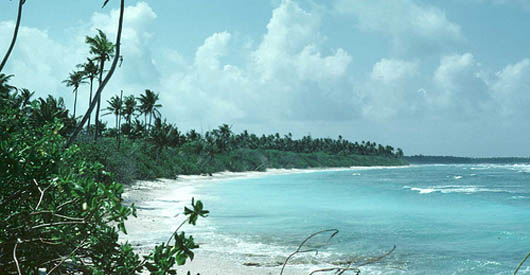The Chagos Islands forms an archipelago in the Indian Ocean and is a “hotspot” of biodiversity containing the largest coral atoll. The British government plans to make 210,000 sq km surrounding the Chagos Islands into the “world’s largest marine reserve;” however, these islands have a “sordid” past. In the late 1960s, the United States and Great Britain expelled the native people and slave descendants in order to create a nuclear air force base. If the area is turned into a marine reserve today, the Chagossians (Ilois) contest they could never return since fishing would be banned deeply impacting their livelihood.

According to the “Virtual Republic of Chagos“, an internet site representing exiled Chagossians:
Today, Chagos archipelago is a military zone and has served in launching B52’s during operation Desert Fox in ’98 in Iraq, and the various bombing attacks on Afghanistan and Iraq thereafter.
The surviving Ilois are still fighting for the return of their country via British courts. The current lease expires in 2016 but has an option to renew for an additional 50 years.
Interestingly, the Chagos Islands were not the first choice for a US nuclear base; however, Aldabra Island north of Madagascar was abandoned because it is the breeding ground for rare giant tortoises. Now, the biodiversity of Chagos may win it a right to be preserved and shut down the cold war base, but its exiled residents have once again lost. The Guardian explains:
The islanders, who number about 4,000 and live in exile in Britain, Mauritius and elsewhere, have battled through the British courts for nearly 20 years for the right to return and appeared to have won an important victory in 2000 when the then foreign secretary, Robin Cook, decided in their favour. But following the September 11 attacks, the UK government reversed Cook’s decision and the Chagos case has migrated between courts. Most recently, the House of Lords ruled against them after Britain cited American security concerns. Their last hope is that the European court of human rights will overturn the decision in their favour in the next few months.
Human rights advocates suspect the “no-take” marine reserve announcement is political, but the UK government does not believe the reserve would prevent the Chagossians’ return. Pew environment group describes:
If the Chagossians are given a right to return, any conservation measures will be adjusted. The aim is to protect the reserve now so that the resources there would be available for the Chagossians if and when they return. As it is, the seas there are being heavily depleted by French and Taiwanese fleets.
Nine environmental groups are supporting the formation of the marine reserve, including Greenpeace. Greenpeace believes the native people “must be fully involved in managing their waters and protecting their seas,” according to Stop Climate Chaos, and the organization opposes the US military base there. Hopefully the Chagossians can return to their islands and be part of its future conservation.

You must be logged in to post a comment.